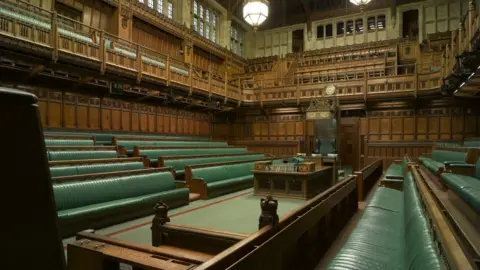Proxy voting: MPs to trial scheme for pregnant women and new parents
MPs on parental leave will be able to nominate another MP to vote on their behalf if new plans announced by the government are agreed.
Proxy voting in Parliament has long been discussed for pregnant MPs and new parents, but despite widespread agreement, it has not come into force.
Andrea Leadsom said if the House voted in favour of the scheme next Monday, a year-long pilot would take place.
It comes after an article accused the Tory chief whip of blocking the change.
"Multiple sources" told the Times that Julian Smith had been trying to stop it from being allowed while trying to get the Theresa May's Brexit deal through Parliament.
The article led to Liberal Democrat Jo Swinson asking an urgent question in the House of Commons about the progress of enabling proxy voting.
She previously accused the Tories of breaking a "pairing" agreement with her when she was on maternity leave.
The pairing system should have seen one MP not voting to cancel out Ms Swinson's absence, but the MP she was paired with - Tory chairman Brandon Lewis - still voted. He has since apologised for an "honest mistake" by whips.
The issue of proxy voting was raised again during last week's crunch Brexit votes on Mrs May's deal as a heavily pregnant Labour MP, Tulip Siddiq, chose to delay her Caesarean by two days and was pushed through the voting lobby in a wheelchair as proxy voting was not available. She said she did not trust the pairing system after Ms Swinson's experience.
Ms Swinson welcomed the government announcement but said it "gives a whole new meaning to being overdue".
"Some have been dragged kicking and screaming to this position," she said.
"We have waited long enough for this change. Modernising the House of Commons is a slow and laborious process and often quite like childbirth. Let's get on with it."

How do MPs vote?
 Getty Images
Getty ImagesWhen a vote is held in the House of Commons, the speaker asks MPs to call out whether they are for or against the bill. If there is not a clear winner, he calls a vote, known as a division.
MPs then go into one of the two rooms at the end of the Commons chamber - the division lobbies - and have to walk through to cast their vote.
Pairing: If members cannot get to Parliament to vote, they can enter an informal agreement known as "pairing". This means an MP from the opposing side of the absent politician agrees not to vote so the numbers are cancelled out.
Nodding through: Another method is known as "nodding through". This means someone's vote can be counted even if they cannot pass through one of the lobbies - as long as they are somewhere on the parliamentary estate. It is traditionally used for people who are too unwell to walk - in the past MPs have voted by being in the back of an ambulance which was driven in and out of the gates.
But it has been used on a small number of occasions in recent years for people with childcare commitments as a result of Lib Dem Jenny Willott negotiating the right in 2011 after the birth of her son Toby.
Proxy voting: This will allow MPs who are heavily pregnant or are on parental leave to nominate another MP to cast their votes. Recommendations from the procedure committee say that the name of the MP nominated to act as the proxy should be published and any changes to the arrangement would require a notice period.

Mrs Leadsom thanked the Lib Dem MP for her campaigning over the issue and agreed that she wanted to make Parliament "a more modern workplace".
She said the pilot would follow plans set out by the cross-party procedure committee, who recommended last year that new parents should be allowed to notify the House of Commons about a specified period of absence - up to six months for mothers and two weeks for fathers - and nominate a member to cast votes on their behalf for that period.
After the pilot year, the scheme would then be reviewed.
"This is a perfect example of how parliament can work collaboratively to bring about important change," Mrs Leadsom added.
Allow X content?

The issue of proxy voting and parental leave has been debated twice in Parliament, but a system to allow it to happen has yet to be formally agreed.
The speaker, John Bercow, said if it was agreed next Monday, he would "have a scheme ready" so members can instantly apply for a proxy - meaning MPs on parental leave would still be able to have their say on the next set of key Brexit votes on 29 January.
